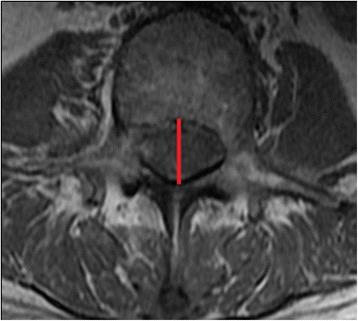◔
Congenital Lumbar Spinal Stenosis: Difference between revisions
From WikiMSK
(Created page with "{{condition |image=CLSS MRI AP diameter.jpg |name= |synonym=Developmental Lumbar Spinal Stenosis, Short Pedicle Syndrome. |definition= |epidemiology= |causes= |pathophysiology...") |
No edit summary |
||
| Line 1: | Line 1: | ||
{{stub}} | |||
{{condition | {{condition | ||
|image=CLSS MRI AP diameter.jpg | |image=CLSS MRI AP diameter.jpg | ||
| Line 29: | Line 30: | ||
{{Reliable sources|synonym1="developmental lumbar spinal stenosis"|synonym2="short pedicle syndrome"}} | {{Reliable sources|synonym1="developmental lumbar spinal stenosis"|synonym2="short pedicle syndrome"}} | ||
[[Category:Infoboxes]] | |||
[[Category:Lumbar Spine]] | [[Category:Lumbar Spine]] | ||
Revision as of 06:18, 6 April 2021
This article is a stub.

| |
| Congenital Lumbar Spinal Stenosis | |
|---|---|
| Synonym | Developmental Lumbar Spinal Stenosis, Short Pedicle Syndrome. |
Congenital (or developmental) lumbar spinal stenosis (CLSS) is a developmental narrowing of the spinal canal. Pedicle length is shorter and a cross-sectionally smaller spinal canal area. Affected individuals tend to present in the fourth or fifth decade of life with neurogenic complications without the presence of significant degenerative changes.
Epidemiology
The incidence of CLSS is unknown. Cheung et al did MRI imaging on 66 patients awaiting surgery for spinal stenosis, and 82 asymptomatic subjects. All were of Chinese ethnicity. All 66 subjects in the patient group had DSS while none of the 82 asymptomatic subjects had developmental canal narrowing.[1]
References
Literature Review
- Reviews from the last 7 years: review articles, free review articles, systematic reviews, meta-analyses, NCBI Bookshelf
- Articles from all years: PubMed search, Google Scholar search.
- TRIP Database: clinical publications about evidence-based medicine.
- Other Wikis: Radiopaedia, Wikipedia Search, Wikipedia I Feel Lucky, Orthobullets,


